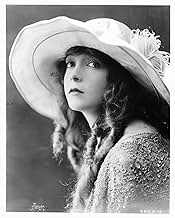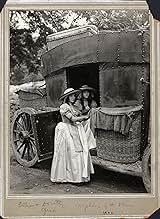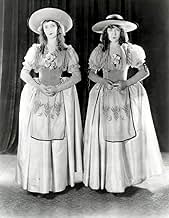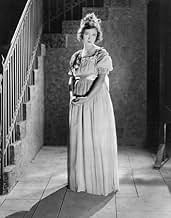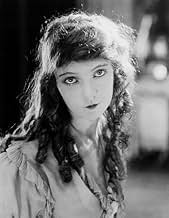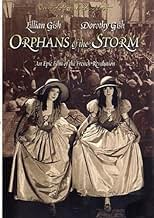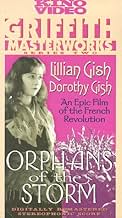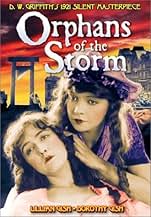Ajouter une intrigue dans votre langueTwo orphaned sisters are caught up in the turmoil of the French Revolution, encountering misery and love along the way.Two orphaned sisters are caught up in the turmoil of the French Revolution, encountering misery and love along the way.Two orphaned sisters are caught up in the turmoil of the French Revolution, encountering misery and love along the way.
- Réalisation
- Scénario
- Casting principal
- Récompenses
- 1 victoire au total
Avis à la une
As a long-time maven of silent films, I have no problem placing myself in that era and enjoying these movies on their own terms. Much has changed since those days, and most folks simply cannot appreciate the simplicity AND complexity of photoplays without words.
This film is magnificent and entertaining. I am not a fan of most "period pieces", but this transcends the typical fare. Check it out.
The French Revolution used to be a frequent setting for some fine films - between the ideas involved and the upheavals that it brought, it's almost ready-made for cinema. Here, as the two sisters, Lillian and Dorothy are struggling to help each other when they are caught up in the turmoil around them, and they find themselves involved with everyone from the lowest classes of society up to some of the best-known personalities of the Revolution.
The historical background is often stylized, and it is mainly there to lend drama to the story about the sisters, rather than to provide an accurate look at history. The characterizations of some of the revolutionary leaders are interesting, but they are not always accurate. Yet from a purely dramatic viewpoint it works well. The involved story, along with the personal appeal of Gish sisters, combine to win the audience's sympathy quickly, and to heighten the tension as the story plays out. It's a well-acted and memorable melodrama.
DOROTHY GISH and LILLIAN GISH are the sisters, with Dorothy as the blind waif who is separated from her sister when an overly amorous nobleman orders Lillian to be brought to his orgy. From there on, the Dickensian plot becomes thicker and thicker as the girls suffer one indignity after another in order to survive.
LUCILLE LaVERNE is the old hag (she later was the model for Disney's Wicked Witch in "Snow White"), a harridan who makes Dorothy a beggar in the streets. "You'll shiver better without a shawl," is one of her immortal lines.
Joseph SCHILDKRAUT is very impressive in an early American screen role, demonstrating charm and skill of the kind that would land him important parts in future costume films like "Marie Antoinette." MONTE BLUE is Danton, a man who meets LILLIAN GISH early in the story and later becomes the defender who saves her and Schildkraut from the guillotine.
It's all very melodramatic, the acting ranging from overdone to wildly overdone. Griffith was never subtle in asking his performers to give it their all. Excessive wringing of hands, eye-rolling to show anguish, fierce looks to show hatred, etc. may cause unintended chuckles when viewed by today's audiences, but there is never any letdown in the telling of a compelling story using the French Revolution as rich background material for a tale of villainy and heroism.
A fascinating silent film with an appropriate film score added to give the story even more force and flavor.
Summing up: Overlong drama, but compelling from the start to the feverishly melodramatic end.
Exquisite close-ups of Lillian Gish are touching and lend poignant charm to her performance.
Part I of the story opens with the killing of a commoner. The slain man's wife is revealed to be the daughter of an aristocratic family who feel she was injudiciously married. They decide to take the infant child from her and leave it on the steps of Notre Dame Cathedral in the dead of winter where she might get picked up and adopted by some kind-hearted soul, with a note attached that reads, "Her name is Louise. Save Her." Later, as the snow continues to fall, a poverty-stricken father named Jean Girard, arrives to leave his own baby, Henriette, to the cathedral steps. After noticing the shivering infant Louise, Girard realizes that he cannot bring himself to do the same for his own child, so he decides to bring home both babies. After returning home to his wife with the babies, Girard encounters a purse full of money left with Louise. With this money, the Girard's rise above their poverty-stricken background and raise the two girls happily in a northern providence. Years pass. A plague comes, killing both parents, and blinding Louise (Dorothy Gish). Henriette (Lillian Gish), her sister and guide, accompanies her blind sister to Paris in the hope of locating a famous doctor who may be able to restore her sight. On their way, they attract the attention of Marquis de Praille (Morgan Wallace), a nobleman, who becomes so interested in Henriette that he arranges to have her kidnapped upon the arrival in Paris and brought to a lavish party given that night at his great estate, thus, leaving the blind Louise to roam the streets of Paris alone, until she is taken in by Pierre (Frank Puglia). But as fate would have it, Pierre has an old hag of a mother, Frochard (Lucille LaVerne), who decides to use the blind girl by having her sing and beg in the streets for money. At first Louise refuses, but after being left alone in a room surrounded by rats, she agrees to do her bidding. As for Henriette, she escapes the estate of De Praille with the aide of Chevalier de Vaudrey (Josef Schildkraut), an aristocrat who not only pities her, but agrees to help her search for Louise. During the search, Henriette falls in love with Chevalier, who, in turn, happens to be the nephew of Louise's birth mother (Catherine Emmett), still mourning for the loss of her child of long ago, now the wife of the famous count, who is unaware of his wife's secret past. PART II of the story continues to focus on Henriette's search for Louise and her encounter with Chevalier. After learning of Louise's whereabouts and being victim of the evil Mother Frochard, she locates the old hag who tells her that her sister has "died." But as Henriette gets closer to learning the truth and finding Louise, something always intervenes to prevent their reunion, especially the riot and outbreak of the French Revolution, having the aristocrats arrested, sentenced and executed by the one and only guillotine, with the innocent Henriette taken in to become one of those tortured victims.
"Orphans of the Storm" ranks one of the best of the DW Griffith silents, and one that should still hold interest throughout, particularly its story that plays liked a chaptered serial. Of all the supporting players, which range from Monte Blue, Sheldon Lewis, Creighton Hale, Louis Wolheim and Kate Bruce, Lucille LaVerne as the mean old hag named Mother Frochard, old clothes, uncombed hair and some missing front teeth, is the most memorable because of her natural meanness. One scene comes to mind is the one when, after forcing the blind Louise to beg on the streets as the snow falls around her, Mother Frochard decides to take the shawl away from her, feeling that the more she shivers, the more money she will collect. LaVerne would play a similar character in appearance in the 1935 MGM version of "A Tale of Two Cities" starring Ronald Colman. LaVerne leaves a lasting legacy playing old hags, especially during French Revolutionary times. Another memorable performance given in this production is by Leslie King (who sometimes resembles Boris Karloff), playing a character named Jacques Forget-Not, an unforgiving sort who avenges those aristocrats who tortured his poor father by sending them to their execution.
In spite of some flaws, and there are several, particularly a couple of unrelated scenes and unnecessary added comedy relief that distract from a viewer's attention, whose main focal point is on the two orphans, there are memorable scenes along with lavish background scenery and costumes that are an added bonus in capturing the flavor of 18th century Paris.
"Orphans of the Storm" was one of 13 silent features shown on public television's 1971 presentation of THE SILENT YEARS, as hosted by Orson Welles, with an original and excellent piano score accompanied by William Perry, the print that was formerly used in the BLACKHAWK VIDEO collection back in the 1980s, and the one formerly shown on Turner Classic Movie's SILENT Sunday NIGHTS before a new copy, available by KINO video, accompanied by a new (and very unsatisfying)chamber music score, clearer picture quality and a longer 150 minutes length. In spite of which version to see, "Orphans of the Storm" still ranks one of the best silents produced by the Griffith company shortly before the great director's decline. (****)
But Griffith's vision of the French Revolution is naive,to put it mildly.He was not apparently aware that the 1789 events were mainly a bourgeois move,and the poor were only a tool.The dichotomy Good Danton/Wicked Robespierre should make people who are looking for a sort of historical accuracy have a look at Wajda"s "Danton"(with G.Depardieu,in the eighties).
Forget history and you have a two-hour and a half silent movie with never a dull moment.Griffith is a wonderful storyteller,who had a great respect for his audience.Some sequences are still impressive today:the aristocratic orgy,when the Poor are starving at the gates of the palace is far from D'Ennery's timid depiction of the scene in the book;Lillian Gish,a wonderful actress who 'd been part of the cinema till the eighties,is so powerful in her part of the abducted maiden Henriette we can almost hear her when she screams out of despair:"is there a man of honor among you?Louise and the shrew who got her under her thumb begging in front of the cathedral as the snow is falling is a splendid picture,recalling a painter's work;even if Danton's coming to the rescue of a soon-to-be guillotined Henriette is thoroughly implausible,we cannot help but admire the director's maestria.
Few silent movies have stood the test of time as well as this one.
Le saviez-vous
- AnecdotesWilliam J. Walsh, an extra playing a soldier, was killed on set when a prop rifle he was leaning on went off by accident; although the weapon was loaded with a blank cartridge, the wadding from a blank fired at point-blank range is capable of inflicting serious injury or death.
- GaffesWhen the Bastille is taken, the prisoners are freed. There are many of them. In reality, only seven prisoners were freed during the taking of the Bastille.
- Citations
Title Card: [Opening lines] TIME, - Before and during the French Revolution. Our story is of two little orphans who suffer first through the tyranny - selfishness - of Kingly bosses, nobles and aristocrats. After the King's Government falls they suffer with the rest of the people as much through the new Government, established by the pussy-footing Robespierre through Anarchy and Bolshevism. Strange that both these evil rulers were otherwise highly moral men except that they saw evil in all who did not THINK AS THEY DID. The lesson - the French Revolution RIGHTLY overthrew a BAD government. But we in America should be careful lest we with a GOOD government mistake fanatics for leaders and exchange our decent law and order for Anarchy and Bolshevism.
- Crédits fousThe starring Gish sisters are not listed in the opening credits. They are introduced on title cards as "Louise--Miss Dorothy Gish" and "Henriette--Miss Lillian Gish."
- ConnexionsEdited into Le Capital au XXIe siècle (2019)
Meilleurs choix
- How long is Orphans of the Storm?Alimenté par Alexa
Détails
- Date de sortie
- Pays d’origine
- Langue
- Aussi connu sous le nom de
- Orphans of the Storm
- Lieux de tournage
- Mamaroneck, New York, États-Unis(D.W. Griffith: Father of Film)
- Société de production
- Voir plus de crédits d'entreprise sur IMDbPro
Box-office
- Budget
- 1 000 000 $US (estimé)
- Durée
- 2h 30min(150 min)
- Mixage
- Rapport de forme
- 1.33 : 1


